- Home
- Stephen R. Donaldson
The One Tree t2cotc-2 Page 15
The One Tree t2cotc-2 Read online
Page 15
Still she could not shake off her tremorous inner disquiet. The bells would not leave her alone. They came so close to meaning, but she could not decipher their message. Her nerves tightened involuntarily.
“That's not what Chant thinks. He thinks his truth is the only one there is.”
Daphin's limpid gaze did not waver. “Perhaps that is true. Where is the harm? He is but one Elohim among many. And yet,” she went on after a moment's consideration, "he was not always so. He has found within himself a place of shadow which he must explore. All who live contain some darkness, and much lies hidden there. Surely it is perilous, as any shadow which encroaches upon the light is perilous. But in us it has not been a matter of exigency-for are we not equal to all things? Yet for Chant that shadow has become exigent. Risking much, as he does, he grows impatient with those who have not yet beheld or entered the shadows cast by their own truths. And others tread this path with him.
“Sun-Sage.” Now a new intentness shone from Daphin-the light of a clear desire. "This you must comprehend. We are the Elohim, the heart of the Earth. We stand at the centre of all that lives and moves and is. We live in peace because there are none who can do us hurt, and if it were our choice to sit within Elemesnedene and watch the Earth age until the end of Time, there would be none to gainsay us. No other being or need may judge us, just as the hand may not judge the heart which gives it life.
"But because we are the heart, we do not shirk the burden of the truth within us. We have said that our vision foreknew the coming of Sun-Sage and ring-wielder. It is cause for concern that they are separate. There is great need that Sun-Sage and ring-wielder should be one. Nevertheless the coming itself was known. In the mountains which cradle our clachan, we see the peril of this Sunbane which requires you to your quest. And in the trees of Woodenwold we have read your arrival.
"Yet had such knowing comprised the limit of our knowledge, you would have been welcomed here merely as other visitors are welcomed, in simple kindness and curiosity. But our knowledge is not so small. We have found within ourselves this shadow upon the heart of the Earth, and it has altered our thoughts. It has taught us to conceive of the Sunbane in new ways-and to reply to the Earth's peril in a manner other than our wont.
“You have doubted us. And your doubt will remain. Perhaps it will grow until it resembles loathing. Yet I say to you, Sun-Sage, that you judge us falsely. That you should presume to judge us at all is incondign and displeasing. We are the heart of the Earth and not to be judged.”
Daphin spoke strongly; but she did not appear vexed. Rather, she asked for understanding in the way a parent might ask a child for good behaviour. Her tone abashed Linden. But she also rebelled. Daphin was asking her to give up her responsibility for discernment and action; and she would not. That responsibility was her reason for being here, and she had earned it.
Then the bells seemed to rise up in her like the disapproval of Elemesnedene. “What are you?” she inquired in a constrained voice. “The heart of the Earth. The centre. The truth. What does all that mean?”
“Sun-Sage,” replied Daphin, “we are the Wurd of the Earth.”
She spoke clearly, but her tone was confusing. Her Wurd sounded like Wyrd or Word.
Wyrd? Linden thought. Destiny — doom? Or Word?
Or both.
Into the silence, Daphin placed her story. It was an account of the creation of the Earth; and Linden soon realised that it was the same tale Pitchwife had told her during the calling of the Nicor. Yet it contained one baffling difference. Daphin did not speak of a Worm. Rather, she used that blurred sound, Wurd, which seemed to signify both Wyrd and Word.
This Wurd had awakened at the dawning of the eon and begun to consume the stars as if it intended to devour the cosmos whole. After a time, it had grown satiated and had curled around itself to rest, thus forming the Earth. And thus the Earth would remain until the Wurd roused to resume its feeding.
It was precisely the same story Pitchwife had told. Had the Giants who had first brought that tale out of Elemesnedene misheard it? Or had the Elohim pronounced it differently to other visitors?
As if in answer, Daphin concluded, “Sun-Sage, we are the Wurd-the direct offspring of the creation of the Earth. From it we arose, and in it we have our being. Thus we are the heart, and the centre, and the truth, and therefore we are what we are. We are all answers, just as we are every question. For that reason, you must not judge the reply which we will give to your need.”
Linden hardly heard the Elohim. Her mind was awhirl with implications. Intuitions rang against the limits of her understanding like the clamour of bells. We are the Wurd. Morninglight swirling with colour like a portrait of the clachan in metaphor. A willow leaved in butterflies. Self-contemplation.
Power.
Eight: The Elohimfest
WHAT the hell?
Linden could not move. The lucidity with which the soundless bells had spoken staggered her. She gaped at Daphin's outstretched hand. It made no impression on her. Feverishly, she grappled for the meaning of the music.
We must hasten-
Had she heard that — or invented it in her confusion?
Hear us too acutely.
Her Land-born percipience had stumbled onto something she had not been intended to receive. The speakers of the bells did not want her to know what they were saying.
She fought to concentrate. But she could not take hold of that language. Though it hushed itself as she groped toward it, it did not fall altogether silent. It continued to run in the background of her awareness like a conversation of fine crystal. And yet it eluded her. The more she struggled to comprehend it, the more it sounded like mere bells and nothing else.
Daphin and Morninglight were gazing at her as if they could read the rush of her thoughts. She needed to be left alone, needed time to think. But the eyes of the Elohim did not waver. Her trepidation tightened, and she recognized another need-to keep both the extent and the limitation of her hearing secret. If she were not intended to discern these bells, then in order to benefit from them she must conceal what she heard.
She had to glean every secret she could. Behind Daphin's apparent candour, the Elohim were keeping their true purposes hidden. And Covenant and the rest of her companions were dependent on her, whether they knew it or not. They did not have her ears.
The music had not been silenced. Therefore she had not entirely given herself away. Yet. Trying to cover her confusion, she blinked at Daphin and asked incredulously, “Is that all? You're done examining me? You don't know anything about me.”
Daphin laughed lightly. “Sun-Sage, this 'examining' is like the 'doing' of which you speak so inflexibly. For us, the word has another meaning. I have considered myself and garnered all the truth of you that I require. Now come.” She repeated the outreach of her hand. “Have I not said that the Elohimfest awaits you? There the coming of Infelice will offer another insight. And also we will perform the asking and answering for which you have quested over such distances. Is it not your desire to attend that congregation?”
“Yes,” replied Linden, suppressing her discomfiture. “That's what I want.” She had forgotten her hopes amid the disquieting implications of the bells. But her friends would have to be warned. She would have to find a way to warn them against the danger they could not hear. Stiffly, she accepted Daphin's hand, let the Elohim lift her to her feet.
With Daphin on one side and Morninglight on the other like guards, she left the hillside.
She had no sense of direction in this place; but she did not question Daphin's lead. Instead, she concentrated on concealing her thoughts behind a mask of severity.
On all sides were the wonders of Elemesnedene. Bedizened trees and flaming shrubs, fountains imbued with the colour of ichor, animals emblazoned like tapestries: everywhere the Elohim enacted astonishment as if it were merely gratuitous — the spilth or detritus of their self-contemplations. But now each of these nonchalant theurgies appeared ominou
s to Linden, suggestive of peril and surquedry. The bells chimed in her head. Though she fought to hold them, they meant nothing.
For one blade-sharp moment, she felt as she had felt when she had first entered Revelstone: trapped in the coercion of Santonin's power, riven of every reason which had ever given shape or will to her life. Here the compulsion was more subtle; but it was as cloying as attar, and it covered everything with its pall. If the Elohim did not choose to release her, she would never leave Elemesnedene.
Yet surely this was not Revelstone, and the Elohim had nothing in common with Ravers, for Daphin's smile conveyed no hint of underlying mendacity, and her eyes were the colour of new leaves in springtime. And as she passed, the wonderments put aside their self-absorption to join her and the Sun-Sage. Melting, swirling, condensing into human form, they greeted Linden as if she were the heir to some strange majesty, then arrayed themselves behind her and moved in silence and chiming toward the conclave of the Elohimfest. Apparelled in cymars and mantles, in sendaline and jaconet and organdy like the cortege of a celebration, they followed Linden as if to do her honour. Once again, she felt the enchantment of the clachan exercising itself upon her, wooing her from her distrust.
But as the Elohim advanced with her, the land behind them lost all its features, became a vaguely undulating emptiness under a moonstone sky. In its own way, Elemesnedene without the activity of the Elohim was as barren and sterile as a desert.
Ahead lay the only landmark Linden had seen in the whole of the clachan- a broad ring of dead elms. They stood fingering the opalescent air with their boughs like stricken sentinels, encompassing a place which had slain them eons ago. Her senses were able to discern the natural texture of their wood, the sapless dessication in their hearts, the black and immemorial death of their upraised limbs. But she did not understand why natural trees could not endure in a habitation of Elohim.
As she neared them, escorted by Daphin and Morninglight and a bright procession of Elohim, she saw that they ringed a broad low bare hill which shone with accentuated light like an eftmound. Somehow, the hill appeared to be the source of all the illumination in Elemesnedene. Or perhaps this effect was caused by the way the sky lowered over the eftmound so that the hill and the sky formed a hub around which the dead elms stood in frozen revolution. Passing between the trees, Linden felt that she was entering the core of an epiphany.
More Elohim were arriving from all sides. They flowed forward in their lambency like images of everything that made the Earth lovely; and for a moment Linden's throat tightened at the sight. She could not reconcile the conflicts these folk aroused in her, did not know where the truth lay. But for that moment she felt sure she would never again meet any people so capable of beauty.
Then her attention shifted as her companions began to ascend the eftmound from various directions around the ring. Honninscrave strode there with his head high and his face aglow as if he had revisited one of his most precious memories. And from the other side came Pitchwife. When he saw the First approaching near him, he greeted her with a shout of love that brought tears to Linden's eyes, making everything pure for an instant.
Blinking away the blur, she espied Seadreamer's tall form rising beyond the crest of the hill. Like the First, he did not appear to share Honninscrave's joy. Her countenance was dour and self-contained, as if in her examination she had won a stern victory. But his visage wore a look of active pain like a recognition of peril which his muteness would not permit him to explain.
Alarmed by the implications in his eyes, Linden quickly scanned the eftmound, hunting for a glimpse of Covenant.
For a moment, he was nowhere to be seen. But then he came around the hill toward her.
He moved as if all his muscles were taut and fraying; his emanations were shrill with tension. In some way, his examination had proved costly to him. Yet the sight of him, white-knuckled and rigid though he was, gave Linden an infusion of relief. Now she was no longer alone.
He approached her stiffly. His eyes were as sharp and affronted as shards of mica. Chant was a few paces behind him, smirking like a goad. As Covenant brought his raw emotions close to her, her relief changed to dismay and ire. She wanted to shout at Chant, What have you done to him?
Covenant stopped in front of her. His shoulders hunched. In a tight voice, he asked, “You all right?”
She shrugged away the surface of his question. What did Chant do to you? She ached to put her arms around him, but did not know how. She never knew how to help him. Grimly, she gripped herself, searched for a way to warn him of what she had learned. She could not put together any words that sounded innocent enough, so she assumed a tone of deliberate nonchalance and took the risk of saying, “I wish I could talk to you about it. Cail had a good point.”
“I got that impression.” His voice was harsh. Since their first meeting with the Elohim, he had been on the verge of violence. Now he sounded rife with potential eruptions. “Chant here tried to talk me into giving him my ring.”
Linden gaped. Her encounter with Daphin had not prepared her for the possibility that her companions might be examined more roughly.
“He had a lot to say on the subject,” Covenant went on. Behind his asperity, he was savage with distress. “These Elohim consider themselves the centre of the Earth. According to him, everything important happens here. The rest of the world is like a shadow cast by Elemesnedene. Foul and the Sunbane are just symptoms. The real disease is something else-he didn't bother to say exactly what. Something about a darkness threatening the heart of the Earth. He wants my ring. He wants the wild magic. So he can attack the disease.”
Linden started to protest, He doesn't need it. He's Earthpower. But she was unsure of what she could afford to reveal.
“When I said no, he told me it doesn't matter.” Chant's mien wore an imperious confirmation. "According to him, I don't count. I'm already defeated.“ Covenant bit out the words, chewing their fundamental gall. ”Anything that happens to me is all right."
Linden winced for him. Trying to tell him that she understood, she said, “Now you know how I feel every day.”
But her attempt misfired. His brows knotted. His eyes were as poignant as splinters. “I don't need to be reminded.” The Giants had gathered at his back. They stood listening with incomprehension in their faces. But he was caught up in bitterness and seemed unaware of the hurt he flung at Linden. "Why do you think you're here? Everybody expects me to fail."
“I don't!” she snapped back at him, suddenly uncaring that she might hurt him in return. “That isn't what I meant.”
Her vehemence stopped him. He faced her, gaunt with memory and fear. When he spoke again, he had regained some measure of self-command. “I'm sorry. I'm not doing very well here. I don't like being this dangerous.”
She accepted his apology with a wooden nod. What else could she do? Behind it, his purpose had hardened to the texture of adamantine. But she did not know what that purpose was. How far did he intend to go?
Holding himself like stone, he turned from her to the Giants. Brusquely, he acknowledged them. The First could not conceal the worry in her eyes. Pitchwife emitted a bright empathy that told nothing of his own examination; but Honninscrave appeared perplexed, unable to reconcile Covenant's report and Linden's attitude with his own experiences. Once again, Linden wondered what kind of bargain it was he so clearly hoped to make.
More Elohim continued to arrive, so many now that they filled the inner curve of the elm-ring and spread halfway up the slopes of the eftmound. Their movements made a murmurous rustling, but they passed among each other without speaking. They were as composed and contained here as they had been in their rites of self-contemplation. Only the bells conveyed any sense of communication. Frowning, she strove once more to catch the gist of the chiming. But it remained alien and unreachable, like a foreign tongue that was familiar in sound but not in meaning.
Then her attention was arrested by the approach of another Elohim. When he fi
rst entered the ring, she did not notice him. Neither his clean white flesh nor his creamy robe distinguished him from the gracile throng. But as he drew nearer-walking with an aimless aspect around the hill-he attracted her eyes like a lodestone. The sight of him sent a shiver down her spine. He was the first Elohim she had seen who chose to wear an appearance of misery.
He had taken a form which looked like it had been worn and whetted by hardship. His limbs were lean, exposing the interplay of the muscles; his skin had the pale tautness of scar-tissue; his hair hung to his shoulders in a sweep of unkempt silver. His brows, his cheeks, the corners of his eyes, all were cut with the toolwork of difficulty and trepidation. Around the vague yellow of his eyes, his sockets were as dark as old rue. And he moved with the stiffness of a man who had just been cudgelled.
He did not accost the company, but rather went on his way among the Elohim, as heedless of them as they were of him. Staring after him, Linden abruptly risked another question.
“Who was that!” she asked Daphin.
Without a glance at either the man or Linden, Daphin replied, “He is Findail the Appointed.”
“ 'Appointed?' ” Linden pursued. “What does that mean?”
Her companions listened intently. Though they lacked her sight, they had not failed to notice Findail. Among so many elegant Elohim,he wore his pains like the marks of torment.
“Sun-Sage,” said Daphin lightly, "he bears a grievous burden. He has been Appointed to meet the cost of our wisdom.
"We are a people united by our vision. I have spoken of this. The truths which Morninglight finds within himself, I also contain. In this way we are made strong and sure. But in such strength and surety there is also hazard. A truth which one sees may perchance pass unseen by others. We do not blithely acknowledge such failure, for how may one among us say to another, 'My truth is greater than yours'? And there are none in all the world to gainsay us. But it is our wisdom to be cautious.

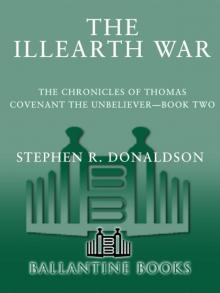 The Illearth War
The Illearth War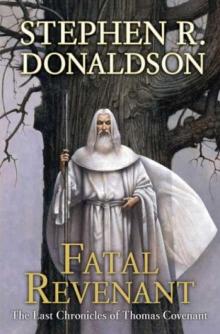 Last Chronicles of Thomas Covenant 02 - Fatal Revenant
Last Chronicles of Thomas Covenant 02 - Fatal Revenant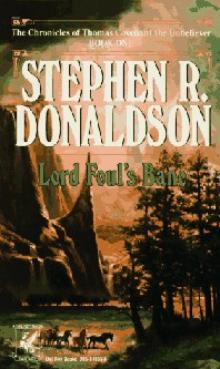 Lord Foul's Bane
Lord Foul's Bane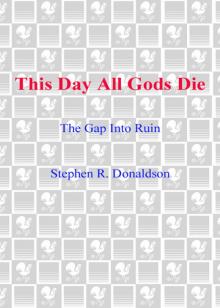 The Gap Into Ruin: This Day All Gods Die
The Gap Into Ruin: This Day All Gods Die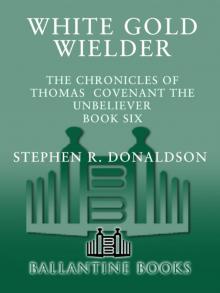 White Gold Wielder
White Gold Wielder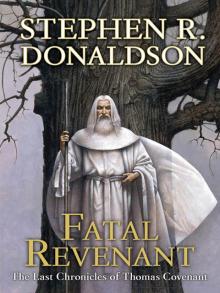 Fatal Revenant
Fatal Revenant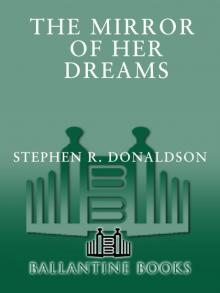 The Mirror of Her Dreams
The Mirror of Her Dreams Against All Things Ending
Against All Things Ending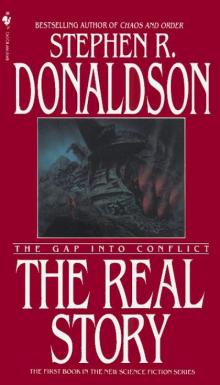 The Real Story: The Gap Into Conflict
The Real Story: The Gap Into Conflict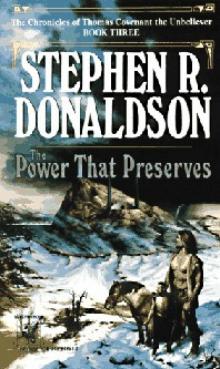 The Power That Preserves
The Power That Preserves Seventh Decimate
Seventh Decimate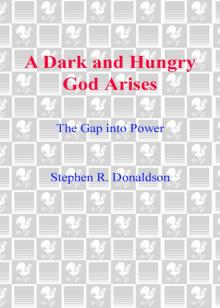 The Gap Into Power: A Dark and Hungry God Arises
The Gap Into Power: A Dark and Hungry God Arises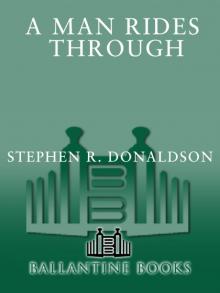 A Man Rides Through
A Man Rides Through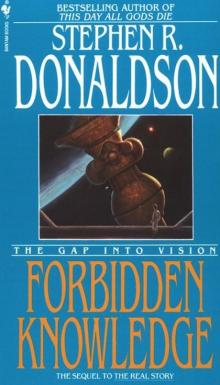 The Gap Into Vision: Forbidden Knowledge
The Gap Into Vision: Forbidden Knowledge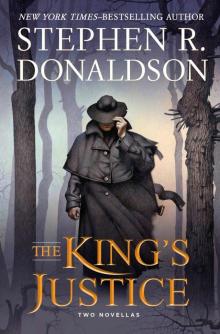 The King's Justice: Two Novellas
The King's Justice: Two Novellas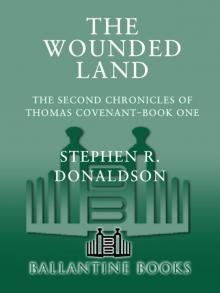 The Wounded Land
The Wounded Land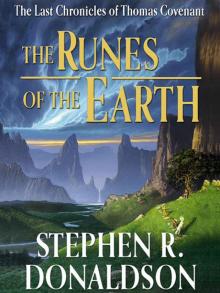 The Runes of the Earth
The Runes of the Earth Mordant's Need
Mordant's Need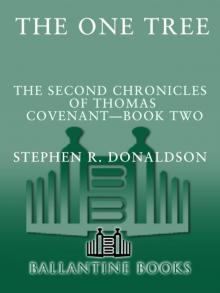 The One Tree
The One Tree Gilden-Fire
Gilden-Fire Reave the Just and Other Tales
Reave the Just and Other Tales The Man Who Fought Alone
The Man Who Fought Alone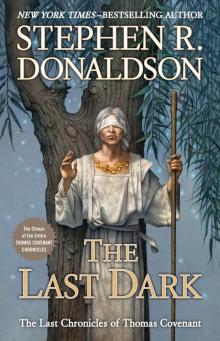 The Last Dark
The Last Dark The Man Who Tried to Get Away
The Man Who Tried to Get Away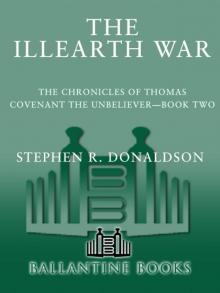 Thomas Covenant 02: The Illearth War
Thomas Covenant 02: The Illearth War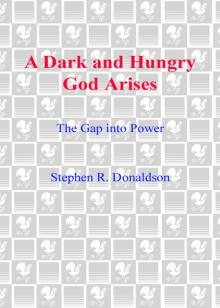 A Dark and Hungry God Arises
A Dark and Hungry God Arises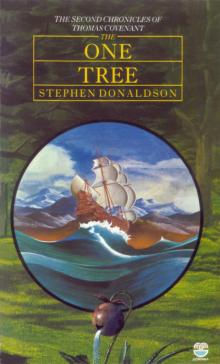 The One Tree t2cotc-2
The One Tree t2cotc-2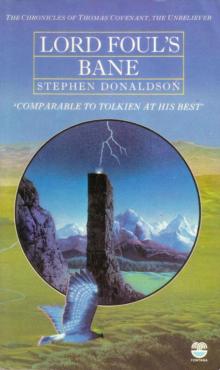 Lord Foul's Bane cotc-1
Lord Foul's Bane cotc-1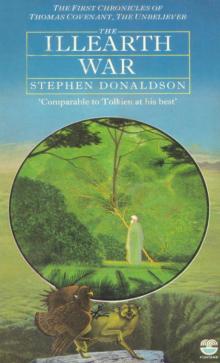 The Illearth War t1cotc-2
The Illearth War t1cotc-2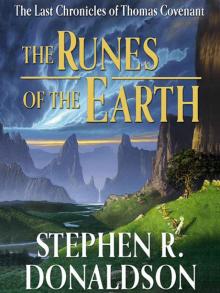 The Runes of the Earth: The Last Chronicles of Thomas Covenant - Book One
The Runes of the Earth: The Last Chronicles of Thomas Covenant - Book One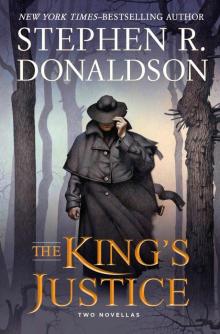 The King's Justice
The King's Justice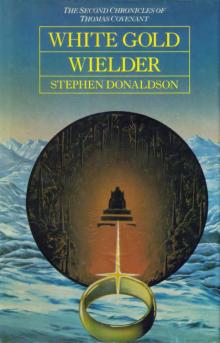 White Gold Wielder t2cotc-3
White Gold Wielder t2cotc-3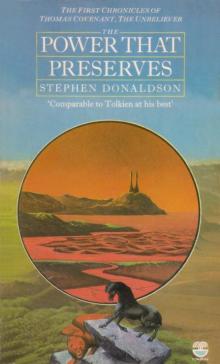 The Power That Preserves t1cotc-3
The Power That Preserves t1cotc-3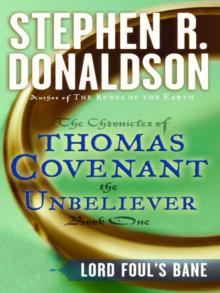 Thomas Covenant 01: Lord Foul's Bane
Thomas Covenant 01: Lord Foul's Bane Chaos and Order: The Gap Into Madness
Chaos and Order: The Gap Into Madness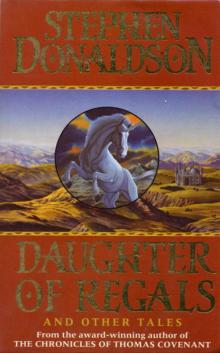 Daughter of Regals
Daughter of Regals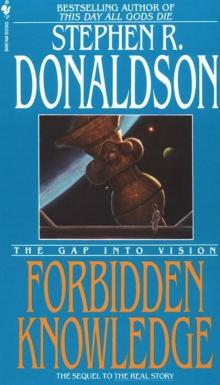 Forbidden Knowledge: The Gap Into Vision
Forbidden Knowledge: The Gap Into Vision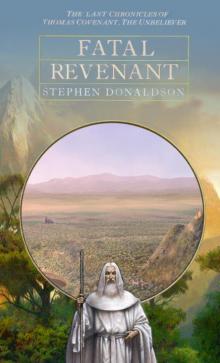 Fatal Revenant t3cotc-2
Fatal Revenant t3cotc-2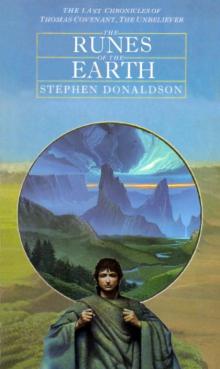 The Runes of the Earth t3cotc-1
The Runes of the Earth t3cotc-1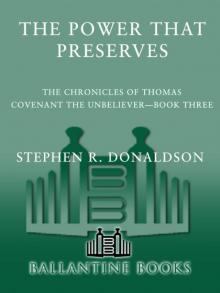 Thomas Covenant 03: Power That Preserves
Thomas Covenant 03: Power That Preserves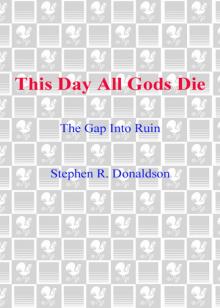 This Day all Gods Die: The Gap into Ruin
This Day all Gods Die: The Gap into Ruin The Wounded Land t2cotc-1
The Wounded Land t2cotc-1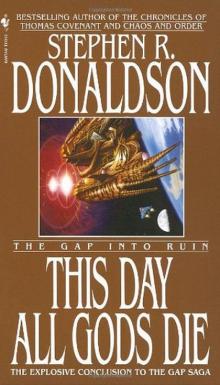 This Day All Gods Die
This Day All Gods Die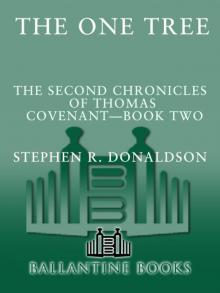 One Tree
One Tree